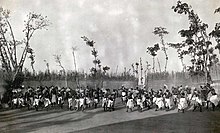

| Yuhi V of Rwanda | |
|---|---|

Musinga (Yuhi) circa 1910
| |
| Mwami of Rwanda | |
| Reign | December 1896 – 12 November 1931[1][2] |
| Predecessor | Mibambwe IV Rutarindwa |
| Successor | Mutara III Rudahigwa |
| |
| Born | 1883 Kingdom of Rwanda |
| Died | 13 January 1944(1944-01-13) (aged 60–61) Moba, Belgian Congo |
| Spouse |
|
| Issue | Mutara III Rudahigwa Kigeli V Ndahindurwa |
| Clan | Abanyiginya |
| Father | Kigeli IV Rwabugiri |
| Mother | Nyirayuhi Kanjogera[4] |
Yuhi Musinga (Yuhi V of Rwanda, 1883 – 13 January 1944)[5] was a king (umwami) of Rwanda who came to power in 1896 and collaborated with the German government to strengthen his own kingship. In 1931 he was deposed by the Belgian administration because of his inability to work with subordinate chiefs and his refusal to be baptized a Roman Catholic. His eldest son, Mutara III Rudahigwa, succeeded him.

Musinga acceded to power as a young teenager, in a palace coup which overturned the short reign of Mibambwe IV Rutarindwa, the original successor to the powerful king Kigeri Rwabugiri (1840–95) of Rwanda. Over his reign Musinga struggled with three major issues. The first was the question of legitimacy. The overthrow of Rutarindwa was organized by members of the Bega clan, including Kanjogera, widow of Rwabugiri and Musinga’s mother. Such an accession to power brought into question the legitimacy of Musinga’s claims to kingship, claims normally defined by clear ritual protocol. The second concerned the relation of the royal court to the separate regions of the country, as following Rwabugiri’s death many areas occupied by his armies broke away, diminishing the domain of the kingdom. Third, Musinga’s accession was quickly followed by the arrival of German forces in the area, along with a powerful missionary order, the “Missionnaires d'Afrique” (the “White Fathers”), creating a colonial context that marked Musinga’s reign (1896–1931).[6]
During Musinga’s reign German power was used to reassert royal authority over many autonomous areas, while the court delegates served as colonial administrators, especially under Belgian rule after World War I. The missionaries were also used to try to extend court legitimacy. However, such policies of collaboration with European actors created strong cleavages at the royal court of Musinga, as political factions competed for power and aligned themselves variously with outside actors and local allies.[7]
Four factors in particular marked Musinga's reign: World War I, and the replacement of German rule by Belgian rule; the expansion of the royal power to areas autonomous of the court; the presence of many powerful competing factions at the court; and a major famine in 1928–29.[8]
In November 1931, Musinga was deposed by the Belgian administration and replaced by his son Mutara Rudahigwa (r. 1931–59). Exiled first to Kamembe, in southwest Rwanda, and then to Kilembwe, in southeastern Congo, Musinga died on 13 January 1944 by natural causes.
| Regnal titles | ||
|---|---|---|
| Preceded by | King of Rwanda 1896–1931 |
Succeeded by |
| Regnal titles | ||
|---|---|---|
| Preceded by | King of Rwanda 1896–1931 |
Succeeded by |
|
| ||
|---|---|---|
| 1st Dynasty |
|
|
| 2nd Dynasty |
| |
| 3rd Dynasty (1650–1961) |
| |
| Pretenders (1961–present) |
| |
| International |
|
|---|---|
| National |
|